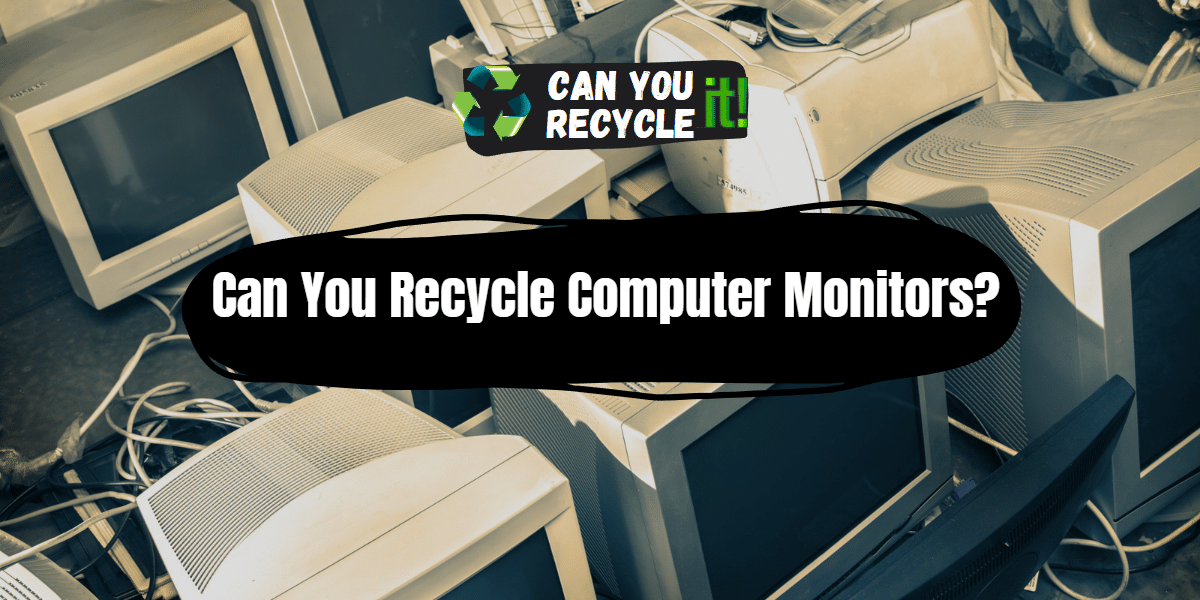Yes, you can recycle computer monitors. Computer monitors contain various materials, including glass, plastic, and metal. These materials can be recycled and reused to create new products.
Computer monitors play a crucial role in our daily lives, but what happens when they reach the end of their life cycle? So, Recycling options for computer monitors depend on various factors such as the type of monitor and local recycling facilities.
In this article, we will explore the dos and don’ts of recycling computer monitors, provide a step-by-step guide to recycling them, discuss alternative options for monitors that cannot be recycled, examine the environmental impact of monitor recycling, address frequently asked questions, and conclude with final thoughts on this topic. So, let’s dive in!
Table of Contents
Do’s and Don’ts
When it comes to recycling computer monitors, it’s essential to keep a few dos and don’ts in mind. Here are some guidelines to follow:
Dos
- Do check local recycling programs: Research local recycling programs or electronic waste collection events that accept computer monitors. Many municipalities have designated facilities for proper electronic waste disposal, including monitors. Find out the specific requirements and procedures for recycling monitors in your area.
- Do consider a donation: If your monitor is still functional and in good condition, consider donating it to charities, schools, or non-profit organizations. Many of them accept used electronics and can refurbish them for reuse.
- Do erase personal data: Before recycling or donating your computer monitor, ensure that all personal data is securely erased. Please take the necessary steps to wipe the hard drive or remove it altogether to protect your sensitive information.
Don’ts
- Don’t dispose of it in regular trash: Avoid throwing computer monitors into regular trash bins. Monitors contain hazardous materials such as lead, mercury, and other toxins that can harm the environment if not disposed of properly. Improper disposal can also result in the loss of valuable materials that can be recovered through recycling.
- Don’t export e-waste illegally: It is crucial to avoid the illegal exportation of electronic waste, including computer monitors. Improper disposal practices can lead to environmental pollution and health risks in developing countries. Always choose legitimate and responsible recycling channels to ensure the proper handling of electronic waste.
5-Step Guide to Recycle Computer Monitors
Recycling computer monitors can be done in a few simple steps:
Step 1
Research recycling options: Start by researching local recycling options for computer monitors. Look for certified electronic waste recycling facilities or collection events in your area. Check if they accept monitors and what their requirements are.
Step 2
Backup important data: Back up any important data stored on the monitor before recycling. Transfer files to another storage device or consider cloud-based storage options. Ensure that you have a copy of all necessary information before proceeding with the recycling process.
Step 3
Prepare the monitor: Disconnect the monitor from power sources and any connected devices. Clean the monitor gently using appropriate cleaning materials. Remove any removable components, such as cables or stands, and set them aside for separate recycling if necessary.
Step 4
Find recycling facility: Take the prepared monitor to the designated recycling facility. If required, schedule a drop-off appointment or arrange for pick-up services. Follow the guidelines provided by the recycling facility to ensure proper handling and disposal of the monitor.
Step 5
Track the recycling process: If possible, inquire about the recycling process and the destination of the monitor after drop-off. Some facilities provide tracking or certification that ensures responsible recycling and proper management of electronic waste.
What to Do with Computer Monitors That Cannot Be Recycled
While recycling computer monitors is ideal, there may be instances where recycling options are limited or unavailable. In such cases, consider the following alternatives:
- Repair or upgrade: If your monitor is unsuitable for recycling but still functional, consider repairing it or upgrading specific components. Repairing a monitor can extend its lifespan and reduce the need for immediate disposal.
- Donate or sell for parts: If your monitor is not recyclable but has salvageable components, consider donating or selling it to individuals or organizations specializing in refurbishing electronics. They can extract valuable parts or repurpose them for other devices.
- Explore manufacturer take-back programs: Some monitor manufacturers offer take-back programs, allowing customers to return their old monitors for proper recycling or disposal. Check with the manufacturer of your monitor to see if they have such a program in place.
- Contact local e-waste recyclers: Contact local electronic waste recycling companies or specialized recyclers who may have options for disposing of non-recyclable monitors. They may have processes to extract valuable materials or safely dispose of the monitors.
Environmental Impact of Recycling Computer Monitors
Recycling computer monitors has several positive environmental impacts. By recycling monitors, we can:
- Reduce landfill waste: Electronic waste, including computer monitors, contributes to the growing issue of landfill waste. Recycling them diverts these items from landfills, where they can release hazardous substances and take up valuable space.
- Conserve natural resources: Recycling computer monitors allows valuable materials such as metals, plastics, and glass to be recovered and reused in manufacturing new products. This reduces the need for extracting and processing raw materials, conserving natural resources.
- Prevent environmental pollution: Computer monitors often contain chemicals like lead, mercury, and flame retardants. Proper recycling ensures these substances are handled safely, preventing their release into the environment and potential contamination of soil, water, and air.
- Save energy and reduce emissions: Recycling monitors requires less energy than producing new monitors from virgin materials. This energy savings translates into reduced greenhouse gas emissions, helping mitigate climate change.
It’s important to note that responsible recycling and proper disposal of computer monitors should be a collective effort. Governments, manufacturers, and consumers must work together to establish effective recycling programs and promote sustainable electronics practices.
FAQs for Can You Recycle Computer Monitors
Can I recycle any type of computer monitor?
The recycling options for computer monitors may vary depending on factors such as the type of monitor (CRT or LCD), size, and local recycling facilities—research local recycling programs or electronic waste collection events to determine which monitors are accepted.
Are there any fees associated with recycling computer monitors?
Some recycling programs may charge a fee for accepting computer monitors due to the costs involved in proper handling and disposal. Contact the recycling facility or program beforehand to inquire about any potential fees.
When recycling a computer monitor, how can I ensure my personal data is secure?
Before recycling, ensure to erase all personal data from the monitor securely. Use specialized software or consult the manufacturer’s guidelines for data-wiping procedures. Alternatively, you can physically destroy the hard drive or storage component containing personal information.
Conclusion and final thoughts 💭
Properly recycling computer monitors is vital for the environment and our communities. By following the dos and don’ts, adhering to responsible recycling practices, and exploring alternative options, we can contribute to reducing electronic waste and promoting a sustainable future. Recycling computer monitors is not just an individual responsibility but a collective effort to protect our planet and conserve valuable resources. Let’s embrace eco-friendly practices, stay informed about recycling opportunities, and inspire others to join the movement toward a greener and more sustainable world.





Leave a Reply